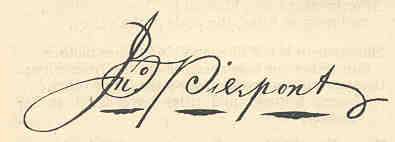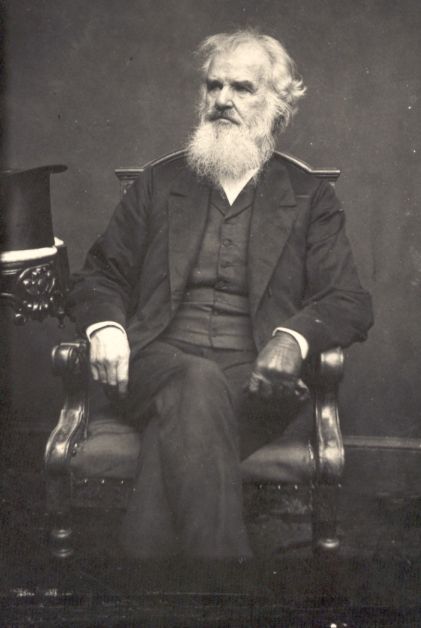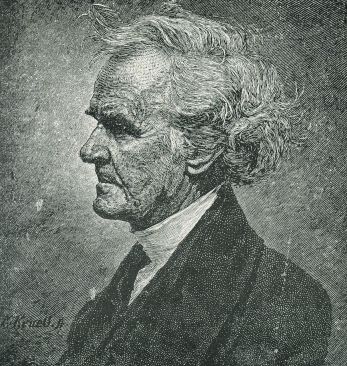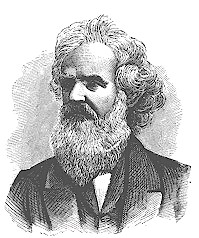|
John Pierpont
Glass Negative Contact Print [The photo appears in Dwight C. Kilbourn, The Bench and Bar of Litchfield Connecticut With a history of its Famous Law School The first in America 347 (Litchfield, Connecticut: The Author, 1909), where it is signed by Pierpont, with the note, "abt. 79 yrs."] John Pierpont was a preacher, poet, lawyer, candidate for Massachusetts governor and other state offices. The following biographical sketch of Pierpont is from Rufus Wilmot Griswold, The Poets and Poetry of America 97-98 (New York: James Miller, Publisher, 1872):
* * * *
At the age of 70, Pierpont became a chaplain for the US Army. He was, at the time of his death, a clerk in the Treasury Department in Washington, D.C. [Bio from Dwight C. Kilbourn, The Bench and Bar of Litchfield Connecticut With a history of its Famous Law School The first in America 272 (Litchfield, Connecticut: The Author, 1909): "JOHN PIERPONT, born in Litchfield April 6, 1785. Graduated at Yale College in 1804. Studied law at the Litchfield Law School and was admitted to this Bar in 1810. He removed to Newburyport, Mass., where after a short practice of law he became an Unitarian Minister. He edited a large number of school books; the old fashioned National Precepter, being perhaps the best known of them. He was also a poet, and his 'Stand, the ground's your own my braves!' has been the standard for boyhood declamations, during the last three-quarters of a century. His poem delivered at our Centennial celebration in 1851, has also become classical. In his earlier years he, like many of the Boston celebreties, was not fastedious in his dress, and the portrait we publish of him [below] is said by all our old men to be a characteristic one. The second [below] . . . looks as he did in later life, when he held a clerical position in one of the Government departments in Washington. He was the ancestor of John Pierpont Morgan, the noted banker and financier. Mr. Pierpont died at Medford, Mass., August 27, 1866."
John Pierpont Rev. John Pierpont John Pierpont John Pierpont
used with permission
of
CyberHymnal  Evert A. & George L. Duyckinck, The Cyclopedia
of American Literature 766 Poems [The Ballot] [The Pilgrim Fathers] [The Pilgrim Fathers] [The Exile at Rest] [My Child] [The Fugitive Slave's Apostrophe to the North Star] [Warren's Address to the American Soldiers, Before the Battle of Bunker Hill ] [Warren's Address to the American Soldiers] [We Conquer or Die] Poetry John Pierpont, Airs of Palestine, a Poem (Baltimore: Printed for the author, 1816)(Boston: Wells & Lilly, 1817) [online text] [online text] ___________, Airs of Palestine and Other Poems (Boston: James Munroe & Co., Boston 1840) [online text] ___________, The Anti-Slavery Poems of John Pierpont (Boston: Oliver Johnson, 1843)(Upper Saddle River, New Jersey: Literature House, 1970) [Boston: Oliver Johnson, 1843 ed., online text] [online text] Emily Taylor, Lays for the Sabbath: A Collection of Religious Poetry (Boston: Walker, Wise, 1860)(revised by John Pierpont) [online text] Writings John Pierpont, The American First Class Book (Boston: Cummings, Hillard, & Co., 1825) [online text] (Boston: Hilliard, Gray, Little, and Wilkins, 1828)(Boston: Carter, Hendee, & Co., 1835) [online text] ___________, The National Reader (Boston: Richardson, Lord and Holbrook, 1829)(Boston: Richardson, Lord and Holbrook and Hilliard, Gray, Little and Wilkins, 1832) [online text] __________, The Young Reader: To Go With The Spelling Book (Boston: David H. Williams, 15th ed. 1839) [online text] __________, Cold Water Melodies, and Washington Songster (Boston: T. Abbot, 1842)(2nd ed., 1843) __________, Lays for the Sabbath: A Collection of Religious Poetry (Boston: Walker, Wise, & Co., 1860)(compiled by Emily Taylor, revised with additions by Pierpont) [online text] |


